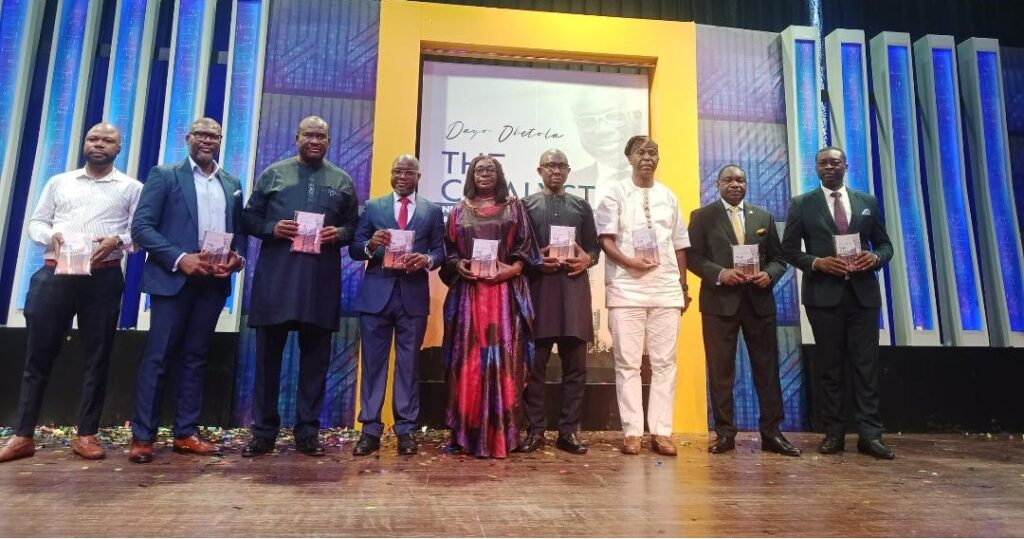Should long years of experience be the major criterion for editorial leadership as canvassed by many veterans in the media industry?
The immediate past Editor Daily of The PUNCH Newspaper, Dayo Oketola says an emphatic NO.
Oketola spoke at his Exaugural lecture titled “Print Journalism in Peril: How Editors Are Battling the Challenges” and presented his book “The Catalyst: Nigerian ICT Evolution Through a Journalistic Lens” on Tuesday, September 17 in Lagos.
He deferred on the notion that younger journalists are too inexperienced to lead newspapers as editors, stating that this perspective is both “flawed and detrimental to the growth and dynamism of the media industry.”
“Age is, indeed, just a number and leadership capability is not determined solely by the length of time one has spent in the industry. Instead, leadership is shaped by dedication, creativity, hard work, and, often, the grace of God,” he stated.
Recalling that after he was replaced as Editor of The PUNCH, a senior colleague told him that he had assumed the role “too early ” Oketola said while such comments” may come from a place of concern or traditionalist thinking, they fail to recognise the changing landscape of leadership across industries, including media.”
Historically, he noted that many individuals, including former Lagos State Governor, Alhaji Lateef Jakande, and former Editor-In-Chief of The Guardian, Debo Adesina rose to prominence in media and beyond at relatively young ages, defying the stereotype that experience is inherently tied to age.
“At just 27, Jakande became the Editor-in-Chief of the Nigerian Tribune in 1956, appointed by none other than Chief Obafemi Awolowo. Jakande’s leadership and editorial prowess, developed at such a young age, not only contributed to the success of the newspaper but also laid the groundwork for his remarkable career as a politician and public servant. His story illustrates that youthful energy and vision can be powerful assets in the realm of journalism.
“Another significant example is Debo Adeshina, who became the Editor of The African Guardian magazine at 27, making him the youngest editor of a major publication at the time. Adeshina’s rise to editorial leadership challenged the traditional age-based hierarchies in journalism and reinforced the notion that younger professionals can excel when given the opportunity. His success did not come from years of experience but from his ability to think critically, lead effectively, and maintain journalistic integrity,” Oketola recalled.
He maintained that the argument that younger journalists are “too inexperienced” to lead ignores the fact that many industries outside journalism have seen youthful leaders flourish.
In the political sphere, Oketola also noted that General Yakubu Gowon was only 31 when he became Head of State in Nigeria at a turbulent time in our history, while the incumbent Minister of Interior, OlubunmiTunji-Ojo is 42, and Bosun Tijani, the Minister of Communications, Innovation, and Digital Economy, is 47—both relatively young by the standards of political leadership but excelling in their roles nonetheless.
Oketola said his appointment as an Editor of the Punch, one of the most widely read newspapers in Nigeria, was a testament that leadership was not dependent entirely on experience but on more qualities.
READ ALSO: Journalists’ safety essential for press freedom – Olorunyomi
While experience may be valuable based on the wisdom of old, the former editor said it is not always the “best predictor of leadership success” and can also come with “a reluctance to embrace change or to think outside the box.”
“Younger editors, unburdened by decades of entrenched practices, are often more willing to experiment, innovate, and take risks that might ultimately lead to the survival and thriving of print journalism in an era of digital disruption,”
With the industry confronting many challenges including declining print circulation, shrinking revenues, and competition from digital platforms, Oketola said it is more important than ever to have leaders who are adaptable and forward-thinking.
“Younger journalists, who have grown up in a digital-first world, are often better equipped to understand the shifts in audience behaviour and the technologies that are reshaping how news is consumed. Their leadership can bridge the gap between traditional journalism and the demands of a new media landscape,” he stated.
Okotola appreciated the vital roles his mentors, colleagues, and the journalism community played in shaping his career through support and guidance that made it possible to achieve a lot in his 16 years of working at The Punch.
Despite the various challenges confronting especially print journalism including the rise of digital media, the decline in advertising revenue, political pressures, and the spread of misinformation, Oketola said print journalism remains essential.
“It’s a foundation that has been responsible for holding power to account, informing the public, and providing a steady voice in the noise of modern media. While digital platforms seem to dominate the space, print journalism still holds a unique position, especially when it comes to delivering thoughtful, well-researched content that doesn’t fall victim to the fast-paced nature of online misinformation. We still offer something that digital media often lacks—credibility built on years of commitment to integrity and thoroughness.”


